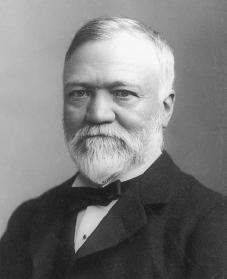Andrew Carnegie's New Year Greeting was published in The Independant magazine on January 5, 1914. At that time, he was still optimistic on the possibility of a permanent end to war. He had always believed in the power of international law to stave off conflict, and he trusted that future wars would be averted by international arbitration. However, only six months later, World War I began.
"The foulest blot remaining upon so-called civilized man, beyond question, is the killing of each other. That he has ceased to eat his fellows after killing them matters nothing to the slain and little to the survivors. It is the killing of each other that stamps man still the savage. That this practice is not soon to pass away from civilized man is unthinkable, since history proves that from age to age, by a law of his being, he has been slowly yet surely developing from the beast; hence we are justified in believing that there is no end to his upward march to perfection. Even today many individual's justify Shakespeare's description:
"What a piece of work is man! How noble in reason! How infinite in faculty! In form and moving how express and admirable! In action how like an angel! In apprehension how like god!"
Women who have reached the angelic stage are found in almost every family circle—heroines who have learned to "deaden love of self" serve their less fortunate sisters by precept and example. Milton's line, "He for God only, she for God in him," is generally reversed in our day. It is the woman who now leads man upward. When in China a leading Mandarin said to me, "The greatest work of your Christ is the elevation of woman."
As long as men can be found willing to become members of a profession which binds them to go forth and kill their fellows as ordered, making this butchery a mere matter of hire and salary, we must reconcile ourselves to the existence of armed forces; but there are influences at work which inspire the belief that this must soon cease. Until recent times the only occupation thought worthy of the gentleman was the profession of arms; in our day he has many to choose from. The duel, once incumbent upon gentlemen, exists no longer wherever our English language is spoken. Even the German Reichstag has voted its abolition, and the Emperor has reduced the number of duels from twelve hundred to twelve per year. As private war (dueling) is being rapidly abolished, national war must soon follow. What is wrong for the individual cannot be right for the nation.
We send this New Year Greeting, January 1, 1914, strong in the faith that International Peace is soon to prevail, thru several of the great powers agreeing to settle their disputes by arbitration under International Law, the pen thus proving mightier than the sword. Three of these did sign such a treaty recently—Britain, France, and the United States, Germany looking on approvingly. Thru mismanagement it failed of approval by the Senate. We have only to try again.
"War is hell," said General Sherman. Peace will be an approach to Heaven. Be of good cheer, kind friends,
"It's coming yet for a'that,
When man to man, world o'er,
Shall brothers be and a'that."
Andrew Carnegie
